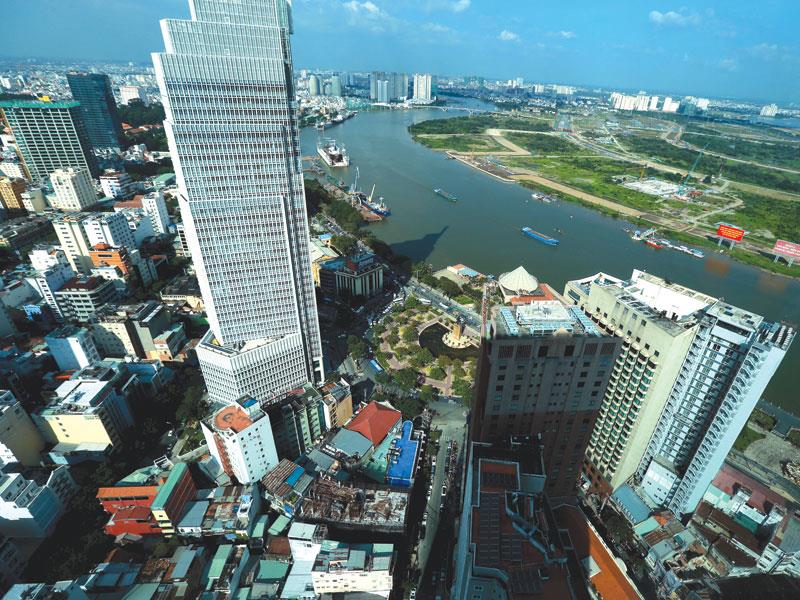AEC bolsters local real estate market
 |
| illustration photo |
Desmond Sim, CBRE head of research for Singapore and Southeast Asia, predicted that demand and supply for industrial and office space in almost every ASEAN nation will increase across the short- and mid-term, as more and more businesses and corporations establish themselves here.
David Blackhall, managing director of VinaCapital, said that the AEC and other free trade agreements are a key factor behind Vietnam’s strong growth, and will continue to play an important role for the foreseeable future across all sectors of the economy, including real estate.
“The AEC brings with it a commitment to the free flow of goods and services, capital and investment, and skilled labour. And Vietnam is already benefiting from this as evidenced by the strong foreign direct investment coming into the country, much of it from fellow ASEAN member states such as Singapore, Thailand, and Malaysia,” Blackhall told VIR.
He also said that all segments of Vietnam’s real estate sector (offices, retail, residential, and land property) will stand to gain from the AEC.
“However, the manufacturing sector is the primary beneficiary of FDI, and industrial parks and logistics/distribution centres will continue to expand, with yields from this sector increasing significantly over the next five-ten years. On the back of this expansion, public infrastructure will also need to be developed at a pace aligned to the expansion of real estate development,” he added.
Oliver Massmann, general director of Duane Morris Vietnam LLC, said that recent market fluctuations pointed to an excessive amount of foreign capital being poured into the property sector.
As of June 2016, a total of $16.6 billion had been invested into this market from ASEAN investors, despite the fact that the AEC was not formed until December last year.
“This is partly because of the recently applied Housing Law and the Law on Real Estate Business allowing foreign investors to legally own, sell, and transfer properties. Regardless, the influence of the AEC is undeniable. Also, similar trends were found in other ASEAN nations such as Thailand and Singapore,” he said.
“This has led many experts to predict that the involvement of Vietnam in the AEC will result in prosperous times for the real estate market. Vietnam can compete well with its ASEAN member countries in this sector,” Massmann confirmed.
“Vietnam has the most liberalised real estate sector in Asia, allowing free hold ownership of land, and houses for foreigners who are married to Vietnamese nationals,” Massmann added.
Michael Piro, COO of Indochina Land, noted that for Vietnam the establishment of the AEC represents a great opportunity to close the development gap with other member states.
“As the AEC will enhance the mobility of capital, business, and human resources across the ASEAN region, real estate segments such as retailing, offices for lease, tourism, and storage can expect significant growth in the years to follow,” Piro told VIR.
The benefits of the AEC for the real estate sector will, however, be offset by barriers such as incompetent management of supply, the lack of a skilled labour force, a large professional gap between the labour forces of countries, and inadequate property support policies.
Piro added that anticipation of the AEC has been rather slow in Vietnam, as seen in the country’s shortages in office space and poor management of retailing space. “Past challenges associated with the limited availability of investable stock and the highly diverging price expectations between buyers and sellers will not be improved with this further increase in competition. Limited supply may serve as the key driver for better service and management. Meanwhile, the housing segment may improve at a slower pace due to legal limitations on foreign ownership,” he said.
“Although the ASEAN real estate market is an attractive destination for many investors, individual countries like Vietnam must improve systematically to compete in the global marketplace,” he added.
What the stars mean:
★ Poor ★ ★ Promising ★★★ Good ★★★★ Very good ★★★★★ Exceptional
Latest News
More News
- An Phat 5 Industrial Park targets ESG-driven investors in Hai Phong (January 26, 2026 | 08:30)
- Decree opens incentives for green urban development (January 24, 2026 | 11:18)
- Public investment is reshaping real estate’s role in Vietnam (January 21, 2026 | 10:04)
- Ho Chi Minh City seeks investor to revive Binh Quoi–Thanh Da project (January 19, 2026 | 11:58)
- Sun Group launches construction of Rach Chiec sports complex (January 16, 2026 | 16:17)
- CEO Group breaks ground on first industrial park in Haiphong Free Trade Zone (January 15, 2026 | 15:47)
- BRIGHTPARK Entertainment Complex opens in Ninh Binh (January 12, 2026 | 14:27)
- Ho Chi Minh City's industrial parks top $5.3 billion investment in 2025 (January 06, 2026 | 08:38)
- Why Vietnam must build a global strategy for its construction industry (December 31, 2025 | 18:57)
- Housing operations must be effective (December 29, 2025 | 10:00)
















 Mobile Version
Mobile Version